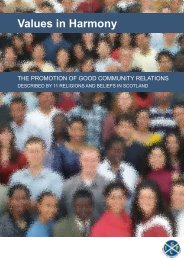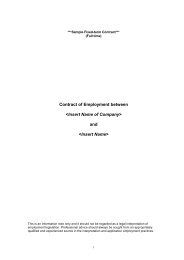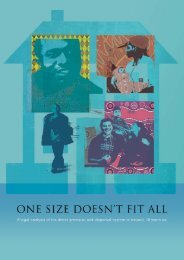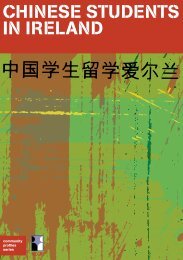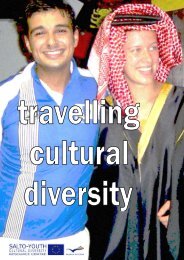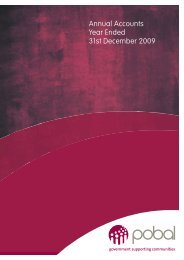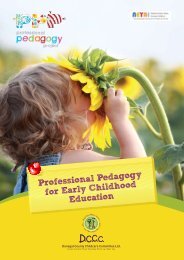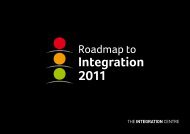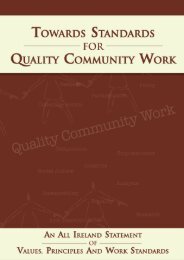Intercultural Education in the Post-Primary School - National Council ...
Intercultural Education in the Post-Primary School - National Council ...
Intercultural Education in the Post-Primary School - National Council ...
You also want an ePaper? Increase the reach of your titles
YUMPU automatically turns print PDFs into web optimized ePapers that Google loves.
INTERCULTURAL EDUCATION ACROSS THE CURRICULUM 5senior cycle is built around a number ofkey concepts-<strong>the</strong> human habitat,population, settlement patterns andurbanisation, and patterns of economicactivity. All <strong>the</strong>se concepts are relevant to<strong>in</strong>tercultural education and provide ampleopportunities for explor<strong>in</strong>g issues of equity,justice and <strong>in</strong>terdependence. Amongst <strong>the</strong>aims of Geography at junior cycle are to• encourage <strong>in</strong> students a sensitiveawareness of peoples, places andlandscapes, both <strong>in</strong> <strong>the</strong>ir own countryand elsewhere• contribute to students’ understand<strong>in</strong>g ofimportant issues and problems <strong>in</strong>contemporary society (Syllabus, p.4).The development of empathy with peoplefrom diverse environments and <strong>the</strong>development of an understand<strong>in</strong>g andappreciation of <strong>the</strong> variety of humanconditions on <strong>the</strong> earth are key outcomesof <strong>the</strong> geography curriculum. In this regardteachers have an important role to play <strong>in</strong>ensur<strong>in</strong>g that ‘third world’ countries arenot depicted as simply a basket ofproblems. A balanced perspective is vital <strong>in</strong>overcom<strong>in</strong>g negative stereotypes of <strong>the</strong>develop<strong>in</strong>g world and its people.Geography also affords <strong>the</strong> opportunity forstudents to explore <strong>the</strong> normality ofdiversity throughout <strong>the</strong> world - that manycountries are multil<strong>in</strong>gual andmulticultural.A detailed audit of <strong>the</strong> opportunities for<strong>in</strong>clud<strong>in</strong>g <strong>in</strong>tercultural <strong>the</strong>mes <strong>in</strong>Geography as well as sample lessons canbe found on <strong>the</strong> CD-ROM and atwww.ncca.ie.HistoryThere is substantial correspondencebetween <strong>the</strong> aims and objectives of <strong>the</strong>history course and those of <strong>in</strong>terculturaleducation. The <strong>in</strong>troduction to <strong>the</strong> JuniorCertificate history syllabus notes, ‘it(history) helps young people to develop atolerance and respect for <strong>the</strong> values, beliefsand traditions of o<strong>the</strong>rs, and to prepare<strong>the</strong>mselves for <strong>the</strong> responsibilities ofcitizenship <strong>in</strong> a national, European andglobal context.’ In Junior Certificatehistory, students engage with humanexperience <strong>in</strong> all its multiplicity anddiversity. The syllabus ‘provides youngpeople with a wide tapestry of past events,issues, people and ways of life…’ and,<strong>in</strong> <strong>the</strong> study of this ‘wide tapestry’encourages ‘An acceptance that peopleand events must be studied <strong>in</strong> <strong>the</strong> contextof <strong>the</strong>ir time’. The awareness of diversityand context are also central to <strong>in</strong>terculturaleducation.The underly<strong>in</strong>g values and approach ofJunior Certificate history are alsocomplementary. Students are encouraged tostrive for objectivity and fair-m<strong>in</strong>dednessand to develop an ability to detect bias andidentify propaganda. The recognition thathistory is always mediated through humanperspective and hence we can have manyaccounts of <strong>the</strong> same events providesstudents with a critical capacity to explore<strong>the</strong> role of <strong>the</strong> historian <strong>in</strong> ‘creat<strong>in</strong>g’history. Students too can be helped to see<strong>the</strong> relationship between history andidentity and <strong>the</strong> role of history <strong>in</strong> provid<strong>in</strong>gpeople with a shared story and collectivememory of <strong>the</strong> past. Such anunderstand<strong>in</strong>g is critical <strong>in</strong> foster<strong>in</strong>g anappreciation and understand<strong>in</strong>g ofdiversity. The work<strong>in</strong>g atmosphere of <strong>the</strong>history classroom, <strong>the</strong>refore, is one <strong>in</strong>which <strong>the</strong> values of <strong>in</strong>tercultural educationshould be readily assimilated.In an <strong>in</strong>clusive History programme• students encounter diverse aspects ofhuman experience <strong>in</strong> a variety ofcultural contexts<strong>Intercultural</strong> <strong>Education</strong> <strong>in</strong> <strong>the</strong> <strong>Post</strong>-<strong>Primary</strong> <strong>School</strong> 67




